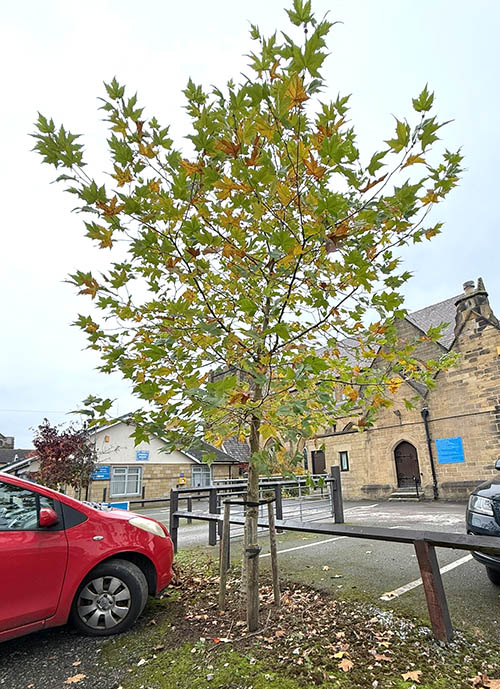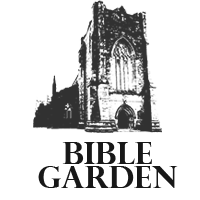Plane Tree (Platanus orientalis)
Map Position: 4The plane tree we usually see in our country is the “London Plane Tree” (Platanus hispanica). This is a cross between the American Plane Tree (platanus occidentalis) and the Oriental Plane Tree (platanus orientalis). We have planted two Oriental Plane trees, which are native to the Holy Land.
The wood of the plane trees is often used for veneer. The tree is used as a source of herbal medicine as well, but there is little scientific evidence for it.

Biblical
Plane trees are usually mentioned together with willows, poplars, and other trees.
Jacob used plane tree twigs to segregate different animals for breeding. (Genesis 30.37 -43): “Then Jacob took fresh sticks of poplar and almond and plane trees, and peeled white streaks in them, exposing the white of the sticks. He set the sticks which he had peeled in front of the flocks in the troughs, that is, the watering places, where the flocks came to drink. And since they bred when they came to drink, the flocks bred in front of the sticks and so the flocks brought forth striped, speckled, and spotted.
And Jacob separated the lambs, and set faces of the flocks towards the striped and all the black in the flock of Laban. He put his own droves apart and did not put them with Laban’s flock. Whenever the stronger of the flock were breeding Jacob would lay the sticks in the troughs before the eyes of the flocks, that they might breed among the sticks, but for the feebler of the flock he did not lay them there. So the feebler would be Laban’s, and the stronger Jacob’s. Thus the man increased greatly and had large flocks, female servants and male servants, and camels and donkeys”. See also 16. Almond.
In Sirach 24:14 (RSV) wisdom is praised and compared to trees: “I [the wisdom] grew tall like a cedar in Lebanon, and like a cypress on the heights of Hermon. I grew tall like a palm tree in En-ged’i, and like rose plants in Jericho; like a beautiful olive tree in in the field and like a plane tree I grew tall”.
God will look after the poor and provide them with what they need (Isaiah 41.19): ”I will put in the wilderness the cedar, the acacia, the myrtle, and the olive. I will set in the desert the cypress, the plane and the pine together; that men may see and know, may consider and understand together, that the hand of the Lord has done this, the Holy One of Israel has created it”.
Furthermore, Isaiah praises the riches the Lord will provide for His people in Zion (Jerusalem and the land Israel): “The glory of Lebanon shall come to you, the cypress, the plane and the pine, to beautify the place of my sanctuary; and I will make the place of my feet glorious”. (Isaiah 60.13) (in the German Catholic Bible it is translated as “cypress, elm and fir”).
Ezekiel (31.8 - 14), the prophet, describes the greatness of the Pharaoh of Egypt as being bigger than the mightiest trees and unparalleled on earth: “The cedars in the garden of God could not rival it, nor the fir trees equal its boughs; neither were the plane trees like its branches; no tree in the garden of God was equal in beauty”. (See also: cedar). However, Ezekiel reminds the Pharaoh of the transience of his glory, and despite his glory being unparalleled on earth he can and will perish.
